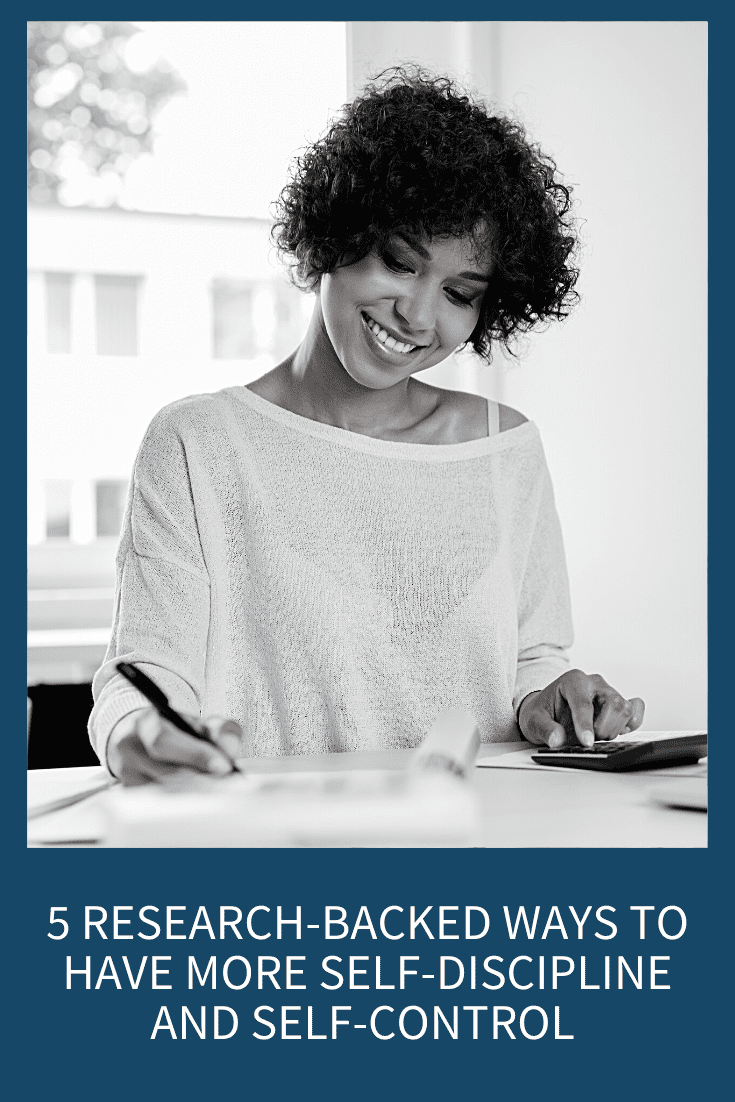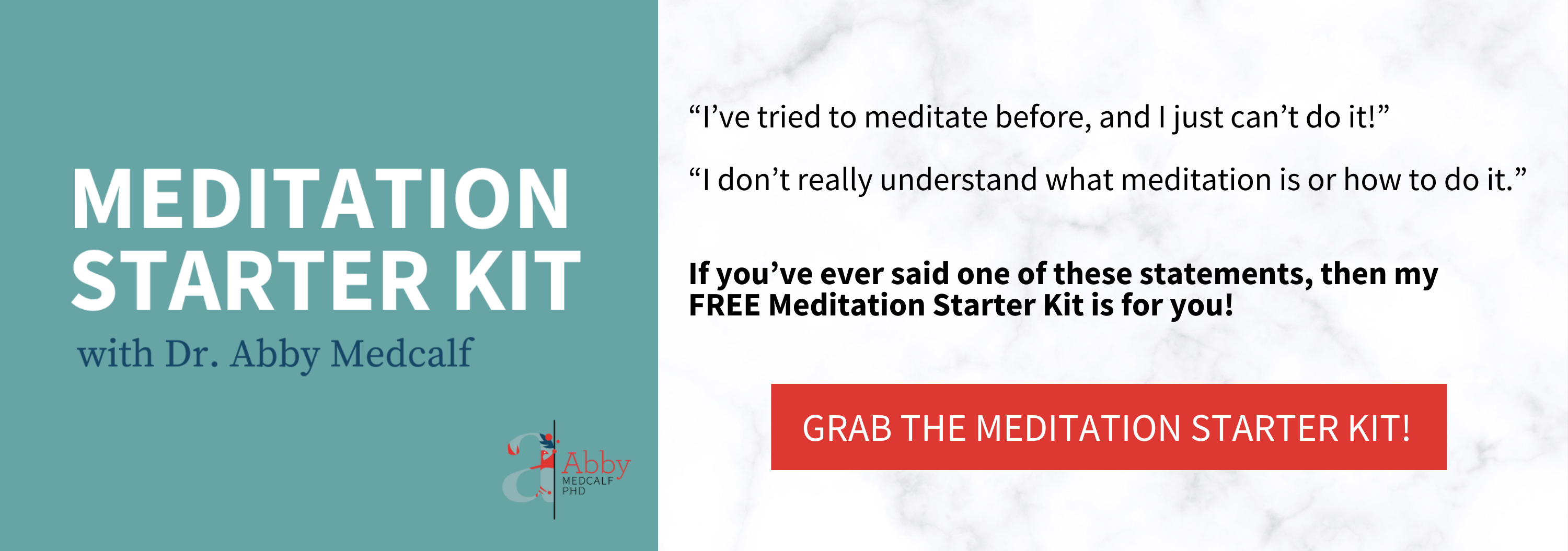
Whether you call it self-discipline, grit, determination or willpower, the research shows that people who learn self-control are happier, healthier and have stronger relationships. But how do you get there – how do you have more self-discipline and self-control? Today I’m sharing a whole new way of understanding willpower and self-discipline, the secret to why you’ve failed in your efforts before and my top five research-backed tips to have you back in control of your life.
15-minute read
What Exactly is Self-Control?
In its simplest form, self-discipline and self-control (or willpower) is our ability to delay gratification. It’s our ability to resist a temptation now to get a goal later. For our purposes today, I’ll be using the word willpower but it’s synonymous with terms like self-discipline and self-control and perseverance so insert whatever word works for you.
As Kelly McGonigal, PhD, wrote in her book The Willpower Instinct, willpower is basically an internal conflict. Sometimes it’s because you want to do something that you shouldn’t (like eating that third brownie or having a cigarette), and other times it’s because you know you should do something, but you don’t want to (like go to the gym or finish that project for work because all you want to do is lay on the couch and smoke a cigarette and eat brownies).
Do I Really Need Self-Discipline and Self-Control for a Happy Life?
There’s a ton of research backing up the claim that self-control is key to a successful and happy life. I’m going to take a minute and share two of the most famous studies that focused on measuring self-control in kids, but if you want to dig deep, I’ll list a bunch of resources at the end of this article.
The first is the now-famous marshmallow experiment, which was started by Walter Mischel, PhD around 1963. In this study, researchers offered four-year-olds the choice of eating one marshmallow now or getting two marshmallows if they wait 15 minutes. They then tracked these kids into adulthood. What they found was that the kids who resisted temptation and delayed gratification waiting for the two marshmallows ended up having happier lives including better physical health, outshining the one-marshmallow kids in school, and having more successful relationships (less separation or divorce).
In another famous study, researchers tracked 1000 kids from birth to 32 years of age. In this study they found that the participants who had greater self-control in childhood had better physical health, made more money and had less issues with drug and alcohol dependence and criminal behavior. They even compared siblings and found that the sibling with lower self-control had poorer outcomes than the sibling with higher self-control even though they came from the same family!
Self-Discipline and Self-Control: An Exhaustible Resource
The vast majority of research shows that willpower is an exhaustible resource. You wake up in the morning with the most you’re going to have, and then deplete it over the course of the day (which is usually when you find yourself smoking that cigarette or having that brownie at 4:00pm).
So, what eats up your willpower? Regular daily habits eat it at a slower rate: showering, eating, going to work, and cleaning up after yourself. But you also use it every time you don’t look at your phone even though you heard a notification; when you tune out your coworker’s incessant talking while you finish that spreadsheet; every time you need to control your temper or deal with your frustration on your morning commute; every time you resist the urge to scroll through social media (or every time you stop scrolling through social media). You use it every time you say “no” to something you want to eat but shouldn’t. You use it with every decision you make, every stressor you need to deal with and every temptation you avoid.
Let’s take this whole idea into your real life. You wake up each day with your full tank of willpower fuel or what I’m going to call willpower units for the sake of this conversation. I’m going to assume you had a decent night’s sleep so we’re going to start your day with 100 willpower/self-control units (this is totally arbitrary, of course, but you’ll get the idea).
Now you’ve got to get yourself ready, make breakfast (hah!) and maybe take care of the kids or walk the dog. As I mentioned, when you’re doing rote things, it takes less of your willpower units because you’re not making a lot of decisions. So, your usual morning routine would take up about 15 of those willpower units you’ve got for your day.
But now let’s say your kid tells you that they can’t find their clean uniform for their game later (even though you remember folding it and leaving it on their dresser last night), or you forgot you were supposed to bring in snack for your kid’s class, or your dog threw up on the rug or you’re trying to eat healthier and need to finally make those steel cut oats you’ve had in the cabinet for two years or that you woke up late and you’re rushing. If you add anything like this, those 15 units have now become 25.
So, you’re out the door in the morning with 75 units for the day (because we both know at least one of those things happens every damn morning). You rush to drop off the kids or get the dog walked and run to work (or back home to work) and/or race to accomplish 90 things before 5:00pm.
If you have a good, relatively easy day without too many surprises and with everything running super smoothly, you’re going to use us about 50 of those willpower units. If anything yucky happened: one of your coworkers was out and you needed to pick up their slack, or you were trying to stay on your diet during the day, or the commute was bad or one of your teeth is killing you and you’ve got to figure out when you’re going to get to the dentist…. those willpower units you’re using could easily inch up to 60 or even the whole 75 that you have left for the entire day!
I’m going to be kind and assume you had a relatively easy day and that you’re now driving home or picking up the kids from school and you’ve got about 25 willpower units left in your tank.
Now it’s time to make dinner (something healthy, of course), clean up, get the kids’ homework done, get the kids to and from their practices, lessons or games, return some emails, call your mom because it’s been a week, clean up the dog poop in the backyard, take the garbage cans to the curb, remember to call the plumber about that leaking faucet… you get the idea. Basically, those 25 units you’ve got left get eaten up VERY quickly and, by 7:00pm you’ve got no willpower units left in the tank!
This is usually the time you’re snapping at your partner, eating something you shouldn’t, having a drink (or two) or maybe sneaking a cigarette (or two) and just trying to make it to bedtime so you can relax.
You’re lying on the couch by 8:00pm with some chips and a glass of wine playing games on your phone while binge watching some show and beating yourself up for not getting to the gym (yet again) or not finishing some chore that’s been on your to-do list for two months now. You’ve still got some hours left in your day when you “should” be preparing healthy food for tomorrow or even going out with friends but all you want to do is sit on the couch and do NOTHING!
And this is because you’ve been thinking of your day all wrong. You’ve been deciding what you can and can’t do based on the hours in your day, versus how many willpower units you have in your day. You can’t motivate yourself to do anything because that would require willpower; it would require emotional bandwidth (same as your willpower) and you’re running on fumes!
You’ve got time left in your day, but you don’t have any mind left in your day. And that’s the big mistake most people make when thinking of self-discipline and self-control! They divide their day into hours and think, “I’ve got time to take on that new project at work, volunteer at my kids’ school or go for a walk” but you’ve got to stop thinking of your day in terms of hours because hours don’t matter if you’ve got no more bandwidth to deal with anything (or anyone).
Your willpower is at the center of your emotional bandwidth. Without that, the time doesn’t matter.
From now on, you’ve got to remember:
It’s not how much time is left in your day; it’s how much mind is left in your day.
Two Things You Can Do About Starting Your Day with Those 100 Willpower Units.
1. You can take things off your plate so there’s less you have to spend willpower units on.
(You can stop laughing now, I’m serious). This will stretch out those 100 units longer over your day.
2. You can add healthy habits that build your willpower.
This way you wake up with more willpower units to use for the day. When you start your day with more willpower units, you increase your motivation, energy levels and emotional bandwidth for that day.
The Big Warning about Building Your Self-Discipline and Self-Control!
Before I tell you what those great tips are to increase your willpower, I need to give you a warning! As I just said, creating specific, healthy habits will increase your willpower. BUT (and this is the big secret no one tells you), when you’re starting a new behavior, it initially depletes your willpower. It’s only when it becomes an automatic habit that you get the benefit of added willpower!
For example, eating healthfully will absolutely add to your willpower units but, as you already know, it’s hard to change how you eat and resist temptations or falling into old patterns. This means that you’re using up more willpower units initially as you change how you eat. Once it becomes a habit, then you’ll reap the rewards. Since it takes an average of 66 days to create a new habit, I tell folks to give new behaviors about three months before you start counting on feeling really better and/or more energized.
Two Things to Keep in Mind When It Comes to Building Healthy Habits to Increase Your Self-Discipline and Self-Control:
1. Only start one new thing at a time.
Once you get that down, then you can add another after that three-month window.
2. Your plate is already full and you’re now trying to create new healthy habits that are going to drain that willpower for a short window.
So, for those three months, take something off your plate (or more than one thing) so you have the emotional bandwidth to take on this new thing. This might mean getting a cleaning person for three months (or adding them more often if you’re already using someone), getting a neighborhood kid to walk your dog or saying “no” to any new projects at work.
The Five Ways to Create More Self-Discipline and Self-Control in Your Life (Backed by Research, of Course):
1. Regular Exercise Can Increase Willpower
I know, I know, I hated hearing this one too. But the facts are the facts. Exercise has been shown to increase willpower because it helps build your willpower muscle. The key is to start small and build up slowly because you literally have to trick your brain into thinking nothing is happening (nothing to see here, move along). This means you don’t join a boot camp if you haven’t exercised regularly in five (OK, twenty) years. Instead, really do park your car farther away when you go somewhere or take the stairs up to your office (or even up one floor and then grab the elevator for the rest of the trip). Volunteer to walk the dog after dinner or any other small hacks you can think of and then slowly build to more over time.
2. Sleep Helps Improve Self-Discipline and Self-Control
Remember how willpower is an exhaustible resource and that you wake up in the morning with the most you’re going to have for that day? Well, if you’ve had a crappy night’s sleep, you’re starting with way less than those 100 willpower units I mentioned earlier. And you already know this because you know those mornings when you haven’t slept well are not mornings you feel motivated for anything! You don’t have the willpower for a healthy breakfast or to jump on that Peleton that’s now piled with clothes in the corner of your bedroom. These are the mornings you find yourself yelling at your kids or snapping at your partner.
Getting a good night’s sleep is your top priority. I want you to think for now on that your day starts when you set your alarm, not when you turn it off. Your day starts the night before when you get your ass to bed at a reasonable time!
I know what you’re thinking. “But, Abby, that’s the only time I have for myself! I need some me time at night.” You’re thinking that because you’re caught in a vicious cycle. If you were to get your ass to bed, you’d have more energy the next day to do “all the things” and you won’t find yourself needing this time at night (or at least not as much of it). You’ll find yourself with more energy at 7:00 p.m. because you’re not depleted so early, and you’ll see that you’re no longer craving this time at night. Instead, you’ll be getting tons of good feelings when you get to bed earlier.
In her book, McGonigal also talks about how getting sleep will make a big difference in how your prefrontal cortex works. She says, “Sleep deprivation (even just getting less than six hours a night) is a kind of chronic stress that impairs how the body and brain use energy. The prefrontal cortex is especially hard hit and it loses control over the regions of the brain that create cravings and the stress response.”
How much sleep is enough? Famed sleep expert, Daniel Kripke says that getting between 6.5 and 7.5 hours a night is great. His research shows that these sleepers live the longest, are happier and the most productive.
3. Improve Your Food to Build Willpower
Studies show that when you eat crappy food, you’re more inclined to make emotional choices than if you’re eating healthy food. This means that you’re going to choose immediate gratification over delayed gratification. You want to do the same thing here as you did with exercise: build slowly so you can maintain for the long haul. If you’re hooked on coffee, try getting rid of one cup a day or swapping out one cup for green tea or water. If you love a big bowl of ice cream every night, try to eat one less scoop or to eat it earlier in the evening instead of right before you go to bed (or in bed – I see you). Again, tell your brain “There’s nothing to see here, move along” and be incremental.
And here’s a tip from the research to make food choices easier. It’s been shown that self-affirmation can help you have more self-discipline and self-control. No, I’m not telling you to look in the mirror and tell yourself you can do it. Instead, use the “I don’t versus I can’t” hack.
When you say “I can’t,” you’ve got no control and you create a feedback loop in your brain that’s just reminding you that you suck. It tells you that you’re forcing yourself to do something (hence eating up that willpower and dashing our self-esteem all in one fell swoop)! Instead, say “I don’t,” which puts you back in the driver’s seat. So, “I can’t have that cookie” becomes, “I don’t eat cookies in the middle of the day.”
Another way of doing this (because I am FULL of actionable tips today) is to say, “I’m a person who…,” which would mean saying something to yourself like, “I’m a person who thinks before I eat.”
4. Willpower — You Can Do It!
You know how I’ve been saying this whole time that willpower is an exhaustible resource? While the vast majority of research shows that to be true, there’s a study that was done at Stanford University in 2010 that suggests that believing your willpower is limited is a contributing factor to it being limited! In a series of experiments, they found that people who believed that willpower isn’t a fixed thing that can be depleted had greater self-control than those who thought it was exhaustible.
I see this in my own life: if I’ve had a bad night’s sleep or just need to get up much earlier than usual, I make it a practice to tell myself the night before that I’m not going to be tired the next day. I just say to myself, “You’re going to feel great tomorrow despite less sleep. You don’t always need your usual amount to feel energized and happy.” And it works!
So, think of doing the same thing for yourself, especially as you’re building your willpower muscle. Let yourself know that even though you don’t have all the healthy habits down yet, you can still resist urges and have self-discipline and self-control and feel good!
A great idea to stay motivated and keep your head in a positive direction is to buy some of my fabulous, inspirational merchandise. Get yourself a t-shirt, mug, tote bag or notebook with that daily reminder that you’ve got this!
5. Learn to Manage Your Stress Better
In her book, McGonigal says, “Being under high levels of stress means that our body’s energy is used up in acting instinctively and making decisions based on short-term outcomes. Our prefrontal cortex loses out in the battle for our energy when high-stress is involved.”
Once again, the research shows that the best ways to manage your stress and increase those willpower units are through mindfulness and meditation as well as some great, short physical hacks.
You can grab my Mindfulness Starter Kit here:
Resources
Why Sleep is the Secret to Great Relationships
3 Tips to Calm Yourself in Seconds
Research
Walter Mischel, The Marshmallow Test (2014).
MS Hagger et al., “Ego depletion and the strength model of self-control: a meta-analysis,” Psychol Bull. 136, no. 4 (2010):495-525.Baumeister and J. Tierney, Willpower: Rediscovering the Greatest Human Strength (New York: Penguin Press, 2011).








